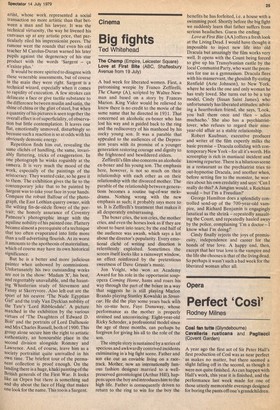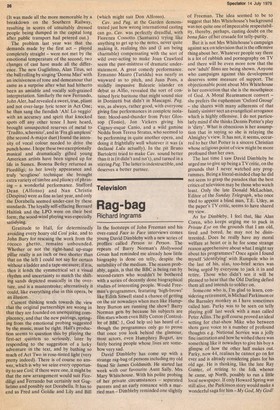Perfect 'Cosi'
Rodney Milnes
Coal fan tutte (Giyndeboume) Cavalleria rusticana and Pagilacci (Covent Garden) A year ago the first act of Sir Peter Hall's first production of Cosi was as near perfect as makes no matter, but there seemed a slight falling off in the second, as though it were not quite finished. As can happen with Hall's work, this year it is finished, and the performance last week made for one of those utterly memorable evenings designed for boring the pants off one's grandchildren. (It was made all the more memorable by a breakdown on the Southern Railway, resulting in scores of unsuitably dressed people being dumped in the capital long after public transport had petered out.) The problem last year was that the demands made by the first act — played completely straight — were not met by the emotional temperature of the second; two changes of cast have made all the difference. The new Guglielmo, Alan Titus, set the ball rolling by singing 'Donne Miei' with an incisiveness of tone and demeanour that came as a surprise after what had hitherto been an amiable and vocally soft-grained interpretation. Similarly the new Ferrando, John Aler, had revealed a sweet, true, pliant and not over-large lyric tenor in Act One; he then sang the fiendish 'A h! Lo veggio' with an accuracy and spirit that knocked spots off any other tenor I have heard, brought unsuspected reserves of metal to `Tradito, schernito', and in 'Fat gli amplessi' • (the second A-major duet) found the intensity of vocal colour needed to drive the punch home. I hope these two exceptionally musical and dramatically gifted young American artists have been signed up for life in Sussex. Bozena Betley returned as Fiordiligi; to her lovely appearance and truly `scoglioso' technique she brought extra variety of timbre and pliancy of phrasing — a wonderful performance. Stafford Dean (Alfonso) and Nan Christie (Despina) were as fine as last year, and only the Dorabella seemed under-cast by these standards. The loyally self-effacing Bernard Haitink and the LPO were on their best form; the wood-wind playing was especially satisfying.
Gratitude to Hall, for determinedly avoiding every hoary old Cost joke, and to John Bury for rescuing the work from the rococo ghetto, remains unbounded. Whether or not the right-hand up-stage pillar really is an inch or two shorter than that on the left I could not say for certain without a ladder and a tape-measure; if it is, then it lends the symmetrical set a visual rhythm and uncertainty to match the shifting sands depicted musically in the overture, and is a masterstroke; alternatively it could, like everything else in this opera, be an illusion.
Current thinking tends towards the view that the original partnerships are wrong in that they are founded on unenquiring com placency, and that the new pairings, spring ing from the emotional probing suggested by the music, must be right. Hall's produc tion seems to question this by playing the first-act quintets so seriously, later by responding to the suggestion of a larky adventure in the text, and by bathing so much of Act Two in rose-tinted light (very pretty indeed). There is of course no ans wer, which is why we seize every opportun ity to see Cost; if there were one, it might be that the new arrangement would suit Fior diligi and Terrando but certainly not Guglielmo and possibly not Dorabella. It has to end as Fred and Goldie and Lily and Bill (which might suit Don Alfonso).
Cav. and Pag. at the Garden demonstrated just how wrong international casting can go. Cav, was perfectly dreadful, with Fiorenza Cossotto (Santuzza) trying like anything to get up to the notes, never quite making it, realizing this and (I am being charitable) compensating with the sort of wild over-acting to make Joan Crawford seem the past-mistress of dramatic understatement. A great comedy performance. Ermanno Mauro (Turiddu) was nearly as wayward as to pitch, and Juan Pons, a stolidly impassive Balearic islander en debut as Alfio, revealed the sort of contained lyric baritone that might sound nice in Donizetti but didn't in Mascagni. Pag. was, as always, rather good, with everyone giving fine performances in complete isolation: blood-and-thunder from Peter Glossop (Tonio), Jon Vickers giving his Cagney-esque Canio, and a wild gamine Nedda from Teresa Stratas, who seemed to be performing in quite another opera, and doing it frightfully well whatever it was (a declasse Lulu actually). In the pit Bruno Bartoletti tried to make Cav. sound better than it is (it didn't and isn't), and turned in a stirring Pag. The latter is indestructible, and deserves a better partner.



































 Previous page
Previous page